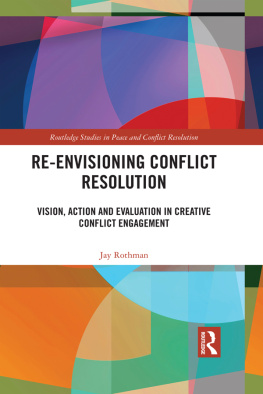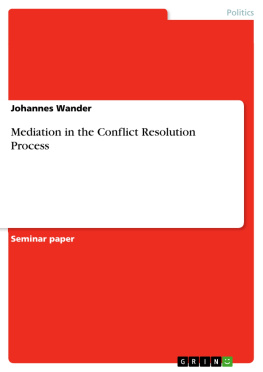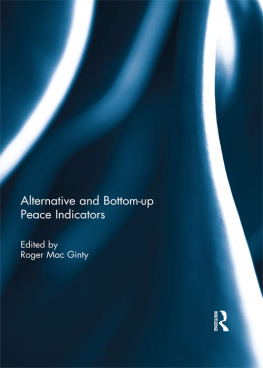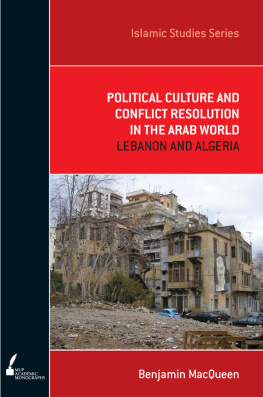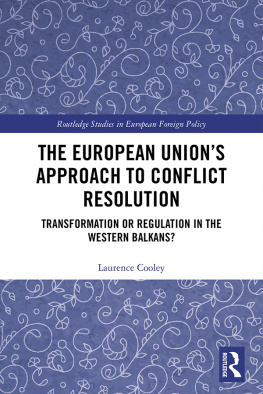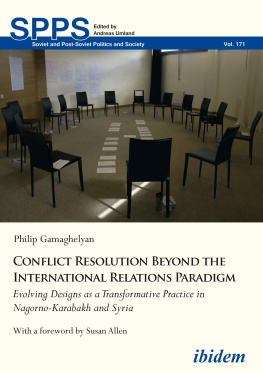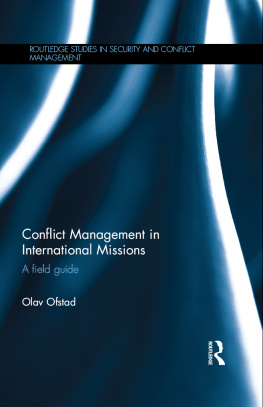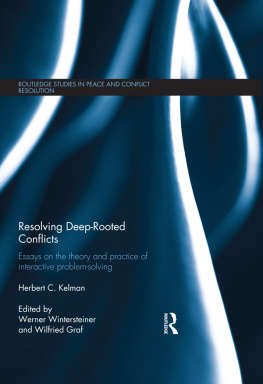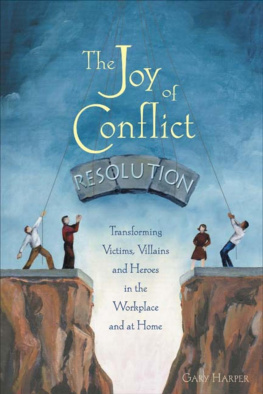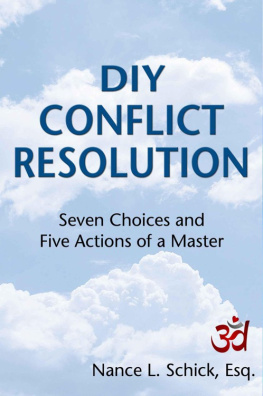Re-Envisioning Conflict Resolution
This book explores the process of assessing success in the field of conflict resolution, with a focus on the Action Evaluation method pioneered by the author.
Since the early days of the field of conflict resolution, researchers and practitioners have been trying to determine how to define and assess success. Are its various approaches to engaging conflict effective? How is effective defined and operationalized and by whom? How might we know? Action Evaluation (AE), a methodology for defining, promoting and assessing success in and of the field, has been developed over the past two decades to answer these questions theoretically and in use. It was designed from its inception to help create sound and contextualized standards around which the field could coalesce. AE is an appropriate methodology for evaluation of conflict engagement, in part because it is grounded in key values of the field, like participation, ownership and the constructive engagement of conflict among stakeholders in project development and implementation. By illustrating how AE is applied through case studies, and providing tools for others to use, this book is intended to make AE a more widely available, user-friendly and rigorous action-research tool for researchers and practitioners in the still-emerging field and beyond.
This book will be of much interest to students of conflict resolution, peace studies, research methods and international relations in general, as well as practitioners in the field.
Jay Rothman is President of the ARIA Group, Inc., a conflict engagement and evaluation consulting firm based in the USA, is Senior Researcher at the Leonard Davis Institute for International Relations at the Hebrew University of Jerusalem and Associate Professor of conflict resolution at Bar-Ilan University, Israel. His latest book is From Identity-Based Conflict to Identity-Based Cooperation: The ARIA Process in Theory and Practice (Springer, 2012).
Routledge Studies in Peace and Conflict Resolution
Series Editors: Tom Woodhouse and Oliver Ramsbotham
University of Bradford
Ceasefire Agreements and Peace Processes
A comparative study
Malin kebo
Conflict Transformation and the Palestinians
The dynamics of peace and justice under occupation
Edited by Alpaslan zerdem, Chuck Thiessen and Mufid Qassoum
Peacebuilding and Post-War Transitions
Assessing the impact of external-domestic interactions
Lisa Gro
Resolving Structural Conflicts
How violent systems can be transformed
Richard E. Rubenstein
African Peace Militaries
War, Peace and Democratic Governance
Edited by David J. Francis
Peace Leadership
The Quest for Connectedness
Edited by Stan Amaladas and Sean Byrne
Legitimacy in Peacebuilding
Rethinking Civil Society Involvement in Peace Negotiations
Franzisca Zanker
Re-Envisioning Conflict Resolution
Vision, Action and Evaluation in Creative Conflict Engagement
Jay Rothman
Universities and Conflict
The role of higher education in peacebuilding and resistance
Edited by Juliet Millican
First published 2018
by Routledge
2 Park Square, Milton Park, Abingdon, Oxon OX14 4RN
and by Routledge
711 Third Avenue, New York, NY 10017
Routledge is an imprint of the Taylor & Francis Group, an informa business
2018 Jay Rothman
The right of Jay Rothman to be identified as author of this work has been asserted by him in accordance with sections 77 and 78 of the Copyright, Designs and Patents Act 1988.
All rights reserved. No part of this book may be reprinted or reproduced or utilised in any form or by any electronic, mechanical, or other means, now known or hereafter invented, including photocopying and recording, or in any information storage or retrieval system, without permission in writing from the publishers.
Trademark notice: Product or corporate names may be trademarks or registered trademarks, and are used only for identification and explanation without intent to infringe.
British Library Cataloguing-in-Publication Data
A catalogue record for this book is available from the British Library
Library of Congress Cataloging-in-Publication Data
A catalog record for this book has been requested
ISBN: 978-1-138-71744-2 (hbk)
ISBN: 978-1-315-19632-9 (ebk)
Typeset in Times New Roman
by Apex CoVantage, LLC
This book is dedicated to the memory of my parents Philip Rothman (19212014) and Esther Rothman (19232017) who passed away while I was writing it. They were both master educators. As I describe in the introduction, success and failure should be understood most broadly not as judgment but as the basis of learning . I learned this key lesson from them about life in general and my work in particular and it has helped me keep perspective about successes and stay resilient about failures.
Writing this book has been a 20-year journey, and in many ways, it is the product of thousands of hands and my very complex and interesting career as a scholar-practitioner moving between the academy and the field. Along the way, I had help and support from many friends, colleagues and family. I will name only a few of them here (with apologies to those I leave out).
Most significantly, I would like to thank my editor, Daniele Natali Goldberg. From outstanding graduate student to trusted colleague, she pushed this book forward with tremendous focus, grace and dedication and ensured its otherwise dubious completion. I also worked previously with additional editors, Israel Sykes and Astrid Reinprecht, who helped me frame this work.
My original partner in this project of developing Action Evaluation, which we conceived together as an appropriate technology for conflict intervention evaluation, was Professor Marc Ross of Bryn Mawr College. Our first funder and ally was Stephen Del Rosso, then of Pew Charitable Trusts. Steve Toben of The Hewlett Foundation joined in funding the next stages of development. Last, Steve Kelban and Sabena Leake of the Andrus Family Foundation partnered with me to move Action Evaluation into the work of social justice (two of the cases in this book The Cincinnati Police-Community Relations Collaborative and the NAMA Fisheries Project were supported by their partnership). Professor Victor Friedman of Jezreel Valley College in Israel has been my main collaborator in the development of wide dissemination of the Action Evaluation methodology. Another key partner in its early development and application was Bill Withers, originally a student and later a trusted colleague.
My pioneering trainees in the methodology in its early days were Susan Allen, Deborah Bing, Rachael Cobb and Orion Kriegman. Students who have worked with me to test and develop the methodology in their MA or PhD work were Stephanie Stobbe, Ian Johnson, Dale Hotaling and Orit Hammerman-Golan. My outstanding employees and colleagues at my consulting company, the ARIA Group, who helped me further refine and apply the process over the years, included Vaughn Crandall, Rob Mclaughlin, Meghan Clarke and Brandon Sipes. My son, Jesse, has read and commented sagely on various chapters. I am particularly grateful to Oliver Ramsbotham, who encouraged and supported me in this project and has helped to marshal it through.

